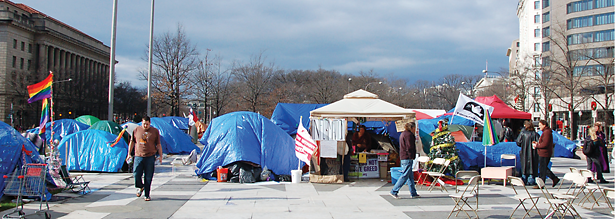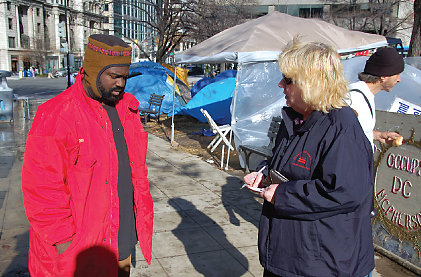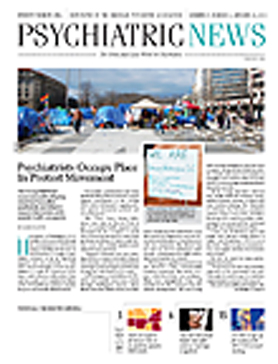The leader of Washington, D.C.’s mobile crisis team walks through the encampment in McPherson Square, handing out her card. In San Francisco, a couple of psychiatry residents set up an “emotional support tent” for protesters. In New York, where it all began, at least one psychiatrist is ready for behavioral problems. And in Boston, still another takes part in a speak-out to explain the failure of the U.S. health care system to care for the poor and mentally ill individuals.
For months, psychiatrists and other mental health professionals have helped support participants in the Occupy Wall Street Movement’s ongoing protest against entrenched political and economic power.
New York’s Cassis Henry, M.D., spent some time at Zuccotti Park as part of a mental health support team developed by the occupiers to assist with behavioral emergencies and other problems involving occupiers and visitors, some with evident mental health and substance problems.
“Support volunteers are now working with the occupiers currently living in two churches, and they are overwhelmed and desperately looking for psychiatrists to help out,” said Henry in an e-mail.
In Washington, Linda Miller, M.S.W., of the city’s mobile crisis team, walked through McPherson Square, three blocks from the White House, two days before Christmas. She talked with a man who said he has depression and uses de-escalation techniques to keep the peace with his campmates. She offered him her card, in case the techniques aren’t enough—as happened the night before, when a policeman was injured.
What began as political protest soon also attracted a more conventionally homeless population. The initial occupiers often faced their own problems. Many were unemployed. Some had traveled across the country to join the earliest encampments. All were living with minimal amenities a few feet from strangers. On top of that, while the activists initially welcomed the homeless as examples of the failure of the economic system, the two groups sometimes found themselves at odds.
All the Occupy sites have a first-aid tent, usually staffed by volunteer nurses, medical students, doctors, or others with some medical training. Two University of California, San Francisco, psychiatry residents, Flavio Casoy, M.D., and Hetty Eisenberg, M.D., went beyond that, collaborating to set up and staff the “emotional first aid” tent at Justin Herman Plaza.
“I saw a lot of substance abuse and people with chronic mental illness in camp,” said Eisenberg, a PGY-3, in an interview. “There was poor communication, even fights, between the homeless and activists.”
She felt the need for some professional intervention.
“People were less safe, and it hurt the coherence of the movement,” she said. “I thought it would be good to facilitate communication and provide support.”
She and Casoy called a meeting for volunteers and set up the tent, offering counseling for trauma, stress, burnout, substance abuse, and help for people who had experienced violence in camp. They trained people in de-escalation techniques to lessen tensions within the camp. Not only psychiatrists but psychologists, social workers, and people who work with the homeless came to work shifts at the tent.
“It was completely voluntary,” she emphasized. “We were not offering professional services, just acting as friends.”
They did develop an algorithm for calling the mobile crisis center in acute cases, however.
“Our goal was not to go in as expert clinicians but to be an equal partner in the movement and foster a different vision of what the country could be like,” he said. “Our patients did the least to cause the current crisis and are the ones who can least afford the resulting cuts.”
Others elaborated on the health system’s shortcomings in relation to the protests.
In Boston, on November 5, 2011, James Recht, M.D., a psychiatrist at Cambridge Hospital and an instructor in psychiatry at Harvard Medical School, along with medical and graduate students and residents from medical and public-health schools at Boston University and Harvard, gave an informational session on the health care system and the necessity for a single-payer program.
A week later, on a “service day,” medical students supervised by physicians offered immunizations, blood-pressure checks, basic mental health screening, and referral for depression and substance abuse to the occupiers encamped in Dewey Square, across from the Boston Federal Reserve building.
The Occupy encampments may seem like a motley collection of tents and tarps, but they are “an incredibly organized movement,” said Recht.
As in San Francisco, there were conflicts between the politically motivated protesters and the homeless.
“That’s unsurprising,” said Recht. “People came together voluntarily from all walks of life.”
Ultimately, for some psychiatrists who worked at movement sites, the economic and political protests weren’t far off the mark from their medical concerns.
“As a psychiatric resident, I feel the pressure of what it’s like for the wealthy to run society,” said Casoy. “Most of us became involved because we feel affected by severe budget cuts to our services that directly affect our ability to provide good care in a fulfilling way, and because we care for the folks who are most victimized by the deeply unfair way our society is run.”
But also, said his colleague Eisenberg, “It was cool to meet people who work with the underserved in the mental health world.”


